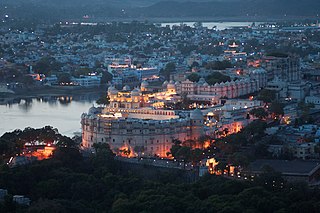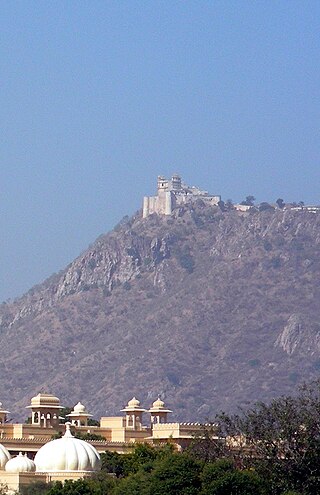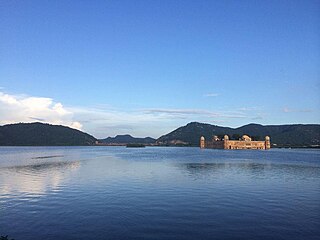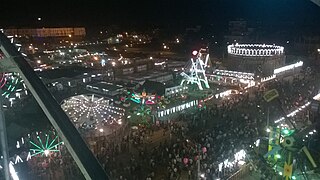
Ajmer is one of the major and oldest cities in the Indian state of Rajasthan and the centre of the eponymous Ajmer District. It is located at the centre of Rajasthan. It is also known as heart of Rajasthan. The city was established as Ajayameru by a Chahamana ruler, either Ajayaraja I or Ajayaraja II, and served as their capital until the 12th century CE.
Bundi is a town in the Hadoti region of Rajasthan state in northwest India. It is of particular architectural note for its ornate forts, palaces, and stepwell reservoirs known as baoris. It is the administrative headquarters of Bundi District. Bundi has many temples, so it is called "Chhoti Kashi".

Bundi is a district in the state of Rajasthan in western India. The city of Bundi is the district headquarters. It has an area of 5,550 km2 and a population of 1,110,906. It is divided into 5 tehsils which are: Bundi, Hindoli, Nainwa, Keshoraipatan and Indergarh.

Udaipur is a city in the north-western Indian state of Rajasthan, about 415 km (258 mi) south of the state capital Jaipur. It serves as the administrative headquarters of Udaipur district. It is the historic capital of the kingdom of Mewar in the former Rajputana Agency. It was founded in 1559 by Udai Singh II of the Sisodia clan of Rajputs, when he shifted his capital from the city of Chittorgarh to Udaipur after Chittorgarh was besieged by Akbar. It remained as the capital city till 1818 when it became a British princely state, and thereafter the Mewar province became a part of Rajasthan when India gained independence in 1947. It is also known as the City of Lakes, as it is surrounded by five major artificial lakes.

Jal Mahal is a palace in the middle of the Man Sagar Lake in Jaipur city, the capital of the state of Rajasthan, India. The palace was originally constructed around 1699; the building and the lake around it were later renovated and enlarged in the early 18th century by Maharaja Jai Singh II of Amber.
Lakheri is a town and municipality in Bundi district in the Indian state of Rajasthan. It is located in the southeast of Rajasthan, around 180 kilometres (112 mi) south of the state capital, Jaipur. Lakheri has been a subdivision headquarters since 2002. Yugantar Sharma (RAS) is the Sub-division Officer and magistrate of Lakheri subdivision. It is the second largest city in the district, after Bundi and 104th largest city in rajasthan.

The Monsoon Palace, also known as the Sajjan Garh Palace, is a hilltop palatial residence in the city of Udaipur, Rajasthan in India, overlooking the Fateh Sagar Lake. It is named Sajjangarh after Maharana Sajjan Singh (1874–1884) of the Mewar dynasty, whom it was built for in 1884. The palace offers a panoramic view of the city's lakes, palaces and surrounding countryside. It was built chiefly to watch the monsoon clouds; hence, appropriately, it is popularly known as Monsoon Palace. It is said that the Maharana built it at the top of the hill to get a view of his ancestral home, Chittorgarh. Previously owned by the Mewar royal family, it is now under the control of the Forest Department of the Government of Rajasthan and has recently been opened to the public. The palace provides a beautiful view of the sunset.

The culture of Rajasthan includes many artistic traditions that reflect the ancient Indian way of life. Rajasthan is also called the "Land of Kings". It has many tourist attractions and facilities for tourists. This historical state of India attracts tourists and vacationers with its rich culture, tradition, heritage and monuments. It also has some wildlife sanctuaries and national parks.

Rajasthan is one of the most popular tourist destinations in India, for both domestic and international tourists. Rajasthan attracts tourists for its historical forts, palaces, art and culture with its slogan "Padharo Mhare Desh " The capital city, Jaipur, also known as Pink City, is a very popular tourist destination and is a part of the Golden Triangle. The Walled City of Jaipur is only the second Indian city to be recognized as a UNESCO World Heritage Site, after Ahmedabad.

Man Sagar Lake is an artificial lake, situated in Jaipur, the capital city of the state of Rajasthan in India. It is named after Raja Man Singh, the then ruler of Amer, who constructed it in c. 1610 by damming the Dravyavati river. The Jal Mahal is situated in the middle of the lake.
Bhimlat Mahadev Temple is a Hindu temple of Shiva which is located at a distance of about 35 kilometers from Bundi district headquarters in Rajasthan, India. The temple is situated in the Aravalli mountain range near a large waterfall named Bhimlat Waterfall. This is a famous temple as well as a tourist destination in the Hadoti region of Rajasthan and devotees come in large numbers to it from south eastern districts of Rajasthan.

Taragarh Fort is a fort located in Bundi, Rajasthan, India. Located high on a hill of aravalli mountain range, it is the principal tourist attraction in Bundi. The fort was built here on a steep hill at a height of 1426 feet. Many tunnels were made in it to exit the fort during the battle. These tunnels are visible at many places in the mountains.

Nawal Sagar Lake is an artificial lake or reservoir situated in Bundi city in the state of Rajasthan in India. It is surrounded by the hills of the Aravalli mountain range. It is a square shaped artificial lake, and a temple dedicated to Varuna, the God of ocean, is partially submerged in the middle of the lake. Nawal Sagar is surrounded by towering walls and has two gateways that serve as entry points to the lake. It is located in the centre of the Bundi city.

Bardha Dam is a gravity dam on the Talera river in the deoriya village of Bundi District, Rajasthan, India. It's a popular tourist destination in monsoon season where thousands of tourist come from different districts of Rajasthan state including Kota, Bundi, Baran Jhalawar, Bhilwara and Jaipur.

Bundi Utsav, or Bundi Festival, is an annual cultural and tourism festival celebrated in the city of Bundi, located in the Hadoti region of Rajasthan, India. This vibrant festival showcases the rich cultural heritage, traditional art forms, and historical significance of Bundi. It typically takes place in the month of November and spans over three days, attracting both domestic and international tourists.

Rajasthan Day or Rajasthan Day also called the Foundation Day of Rajasthan is celebrated on 30 March. On this day many cultural activities organised at Jaipur, the capital of Rajasthan and also at every district headquarters in Rajasthan. On March 30, 1949, the princely states of Jodhpur, Jaipur, Jaisalmer and Bikaner were merged to form 'Greater Rajasthan Union'. Since then the celebration of Rajasthan Day started.

Kajali Teej Mela is an annual fair celebrated in the historic city of Bundi, located in the Hadoti region of the Indian state of Rajasthan. The fair is organised during the Hindu month of Shravan (July–August), specifically on the third day of the bright half of the lunar month, known as Teej.

Kishore Sagar Talab, also known as Kishore Sagar, is a historic artificial lake situated in the city of Kota, Rajasthan, India. It was constructed in the 14th century and spans approximately 37 acres.

Sukh Mahal, also known as Sukh Niwas Mahal, is a historic palace located in Bundi, a district in the Indian state of Rajasthan. The palace is often associated with Rudyard Kipling, who is believed to have drawn inspiration from its beauty for his famous work, "Kim (novel)".

















